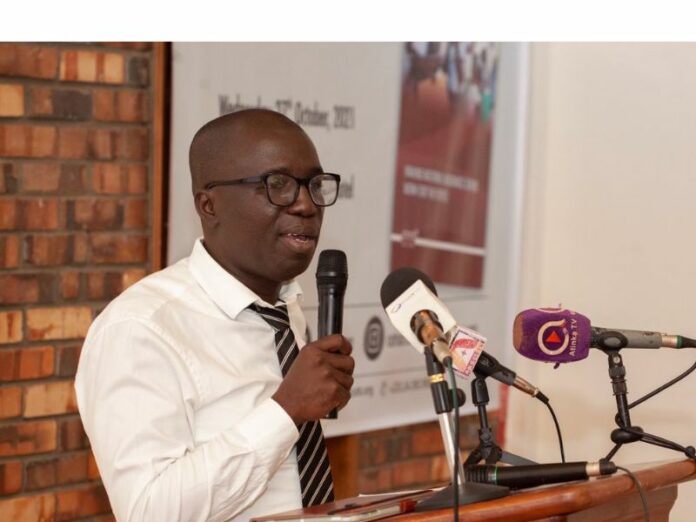A leading Public Policy think tank and Consumer Protection Organisation, CUTS International, Accra, is rallying Ghanaian consumers to join in the advocacy to get government through the Ministry of Trade and Industry (MOTI) to prioritise the passage of the Consumer protection law.
The law, when passed will empower, protect and enhance the welfare and interest of the consumer, promote a fair, transparent and efficient marketplace and also improve consumer awareness, education and information.
Speaking at a meeting organised by CUTS with partnership from the Law Faculty of the University of Professional Studies (UPSA), in Accra, to mark World Consumer Rights Day, the West African Regional Director for CUTS, Mr. Appiah Kusi Adomako, emphasised that it is evidently clear that the absence of Consumer Protection Law in the country has contributed to the widespread and deliberate abuse of consumer rights.
Mr. Adomako explained that consumer rights are like fundamental human rights which the state has to promote, protect and safeguard through the enactment of laws and its enforcement.
“With the passage of Companies Act, 2019, (Act 992) and Corporate Restructuring and Insolvency Act, 2020, (Act 1015), the next bill for consideration should be the Consumer Protection Bill as the two deal with the protection of supply and demand sides of the market participants. Experience tells us that in Ghana to get a bill passed, there must be a strong movement behind.” Mr. Adomako said.
“Imagine, a consumer walks into a shop to buy an item and takes it home and changes his or her mind. In about 99% of scenarios in the country, the consumer will not be able to return it because the shop has clearly written: goods sold are not returnable although this is against the existing laws” he added.
Dr. Franscica Kusi Appiah, a law lecturer at the University of Professional Studies (UPSA) underscored the importance of such meetings. She said consumer ought to be empowered to know their rights in various provisions.
The Communication and Programmes Lead for CUTS, Mr. Shadrack Nii Yarboi Yartey, revealed CUTS and Consumer Protection Agency (CPA) have mobilised over 20,000 signatures urging the Executive to tidy up every work that needs to be done on the draft bill and have it forwarded to Parliament.
“Unfortunately, the marching feat of over 20,000 Ghanaians who is calling for government to prioritize the bill was not enough to be convince the government to do the needful,” Mr. Yartey added.
Head of Research for CUTS, Mr Isaac Yaw Obeng also mentioned that “With the Africa Continental Free Trade Agreement (AfCFTA) operationalised and trading started, there is the need to have enhanced standards to protect Ghanaian consumers from substandard goods. The only way that the Ghanaian consumers can be empowered is through the passage and implementation of National Consumer Protection Law.”
Various regulators including the National Communication Authority (NCA), Food and Drugs Authority (FDA), National Petroleum Authority (NPA), Ghana Standard Authority (GSA), Public Utilities and Regulatory Commission (PURC) highlighted what their respective organizations are doing to protect the welfare and right of consumers in the absence of the Consumer Protection law.
The Deputy Director, Consumer and Corporate Affairs at the National Communication Authority (NCA), Mr Kwame Gyan, underscored the measures the NCA has put in place to address consumer concerns in the telecommunication sector. He indicated that a special desk has been established to listen to consumer concerns and address them.
A manager with the Consumer Unit at the National Petroleum Authority (NPA), Natasha Boakye, also said that the Authority recently embarked on a nationwide campaign to sensitise consumers on the use of fire extinguishers and the various redress mechanics available to them. She also explained that the Authority often conducts random checks at filing stations across to the country to ascertain the quality of fuel sold to consumers.
“These exercises are conducted to ensure that Oil Marketing Companies (OMCs) do not compromise on the quality and quantity of their petroleum products they sell to consumers and prosecute those that sell sub-standard fuel,” she added.
The Director of Legal at the Public Utilities Regulatory Commission, Mrs Nancy Atiamo, also indicated that consumer rights and welfare is at the heart of what they do as a commission. They organize public education campaigns to enlighten consumers.
On her path, a Marketing Officer and in-house graphic designer at the Ghana Standard Authority is committed to protecting the rights of consumers. Ensuring that products sold on the market meets Ghanaian and international standard which is safe for all.









